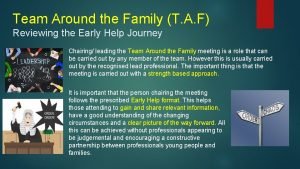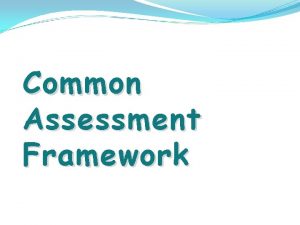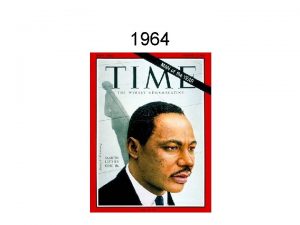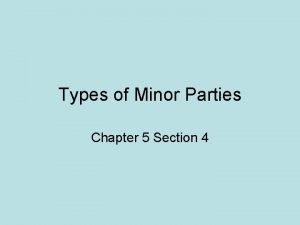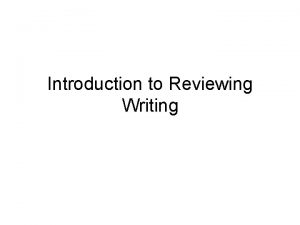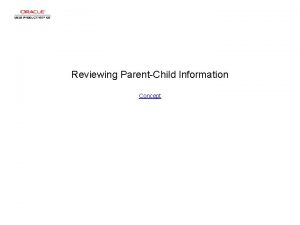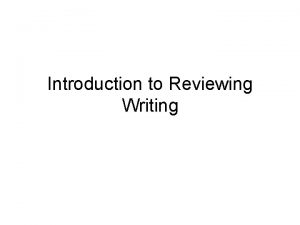Team Around the Family T A F Reviewing





- Slides: 5

Team Around the Family (T. A. F) Reviewing the Early Help Journey Chairing/ leading the Team Around the Family meeting is a role that can be carried out by any member of the team. However this is usually carried out by the recognised lead professional. The important thing is that the meeting is carried out with a strength based approach. It is important that the person chairing the meeting follows the prescribed Early Help format. This helps those attending to gain and share relevant information, have a good understanding of the changing circumstances and a clear picture of the way forward. All this can be achieved without professionals appearing to be judgemental and encouraging a constructive partnership between professionals young people and families.

The Team Around the Family Structure The Early Help Format The meeting begins with introductions and all present explore the Smart planning from the previous meeting Circumstances may have changed new presenting needs may have arisen yet reviewing the original planning helps all to remain focused. By looking at the results from your previous agreed planning, you will gain a clear picture of what has worked well and what could still be better Things that have been completed can be recorded as working well. Things that have not been completed should be explored and where relevant be recorded as things that could still be better and why. These will require updated planning. Once the previous plans have been reviewed any updated planning recorded its time to move on. Uncompleted agreed tasks will usually highlight other issues or areas of need that should then be recorded as what could be better and accounted for in the updated planning.

The Team Around the Family Structure The Early Help Format By making general enquiries or specifically asking about the five areas of life you can identify and record any additional areas that are working well or could be better and why. The T. A. F meeting MUST acknowledge the voice of the child. This and all other points from the meeting should be recorded on your current Early Help Assessment. Your planning Must ensure that relevant outcomes and information is to be shared (where age appropriate) with the young person. The Team Around the Family Early Help Format will support professionals to re affirm the key principals of the Early Help Journey. By asking parents and young people to score how they feel acts as a measure of improvement and an early indicator of areas requiring more support. This style of meeting should be maintained during the period of support and should not be replaced by other styles of meeting.

What could be better and why? Think about what’s important to you and your family This is where we record your worries & our worries. Everyone deserves to be happy: what could be better? What’s working well? This is where you record the good stuff! What makes you happy? Think about what you’re good at; your successes. Who makes up your support networks? Score 1 - 10 What needs to happen? The Plan. What’s important for you and your family? What would make you happy? What are your goals? Actions needs to be set to help you and your family achieve them. Recording the outcome from all your T. A. F meetings should be made on the same electronic form that you recorded your initial assessment on. You are then always in a position to share your up to date copy of the completed Early Help Journey, with parents, young person or other professionals if needed. Please see below an example of how this then appears for one of the five areas of life. Home: Initial meeting with mum and P. MAN (Teacher) (22. 1. 2018) Initial meeting with mum and P. Man (Teacher) (22. 1. 2018) Mum 6 “The Kids could do with having separate rooms as “I like the area I live in” (mum) “All my bills utility are paid on direct debit, so I don’t they are always arguing”. (mum) owe them anything “ “I want my own room. I shouldn’t have to share” (child a) “My mums a good cook and makes my lunch” (child a) T. A. F meeting (25. 2. 18) with mum and P. Man and J. Lo (Health Visitor) Initial meeting with mum and P. Man (Teacher) (22. 1. 2018) Mum has agreed to register on Manchester move by the end of this week. Child A. Practitioner to meet with mum and child a, a next Monday at School to talk about room 3 sharing. T. A. F meeting (25. 2. 18) with mum and P. Man and J. Lo (Health Visitor) Now you can continue to record the Early Help Journey. Remember each text box expands

Key points to remember Whenever possible change who chairs the meeting. All are responsible for making the process work. Key tasks like chairing the meetings and making referrals should be shared by members of the Team Around the Family. Your meeting should start by exploring the S. M. A. R. T planning as agreed from your previous meetings. Record the outcomes from your T. A. F meeting on the same electronic form as your initial assessment. This provides one single record of the complete Early Help Journey. If needed any professional involved with a Team Around the Family can access further information, help and support by contacting one of the 3 Early Help Hubs. You may be required to submit a Request For Early Help Support Form. You can get a copy of the form from our web page: manchester. gov. uk/earlyhelppractitioner
